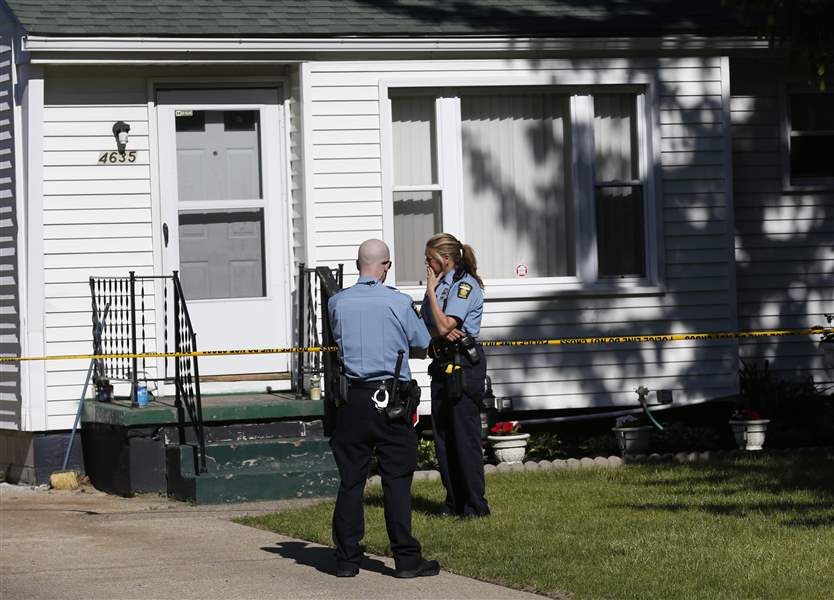
Federal appeals court sides with TPD in informant murder lawsuit
8/21/2018
The home of Thomas Przybysz, who was stabbed and killed outside of his residence in 2014.
The Blade/Lori King
Buy This Image

From left, Scott Warnka, Roy Cerveny, and John Haugh.
COLUMBUS — A federal appeals court on Monday refused to assign blame to Toledo vice police for the 2014 murder of a confidential informant at the direction of the drug dealer he helped to set up.
A three-judge panel of the U.S. 6th Circuit Court of Appeals upheld a lower U.S. District Court ruling that dismissed the wrongful death lawsuit filed by the mother of Thomas Allen Przybysz, 30, who was stabbed 15 times outside his Point Place home.
Scott Warnka, 34, and his cousin, Roy Cerveny, 34, in 2015 reached plea deals in which they testified against John Haugh, 42, who carried out the stabbing. Haugh is serving a life sentence for aggravated murder, Warnka is serving an 11-year involuntary manslaughter sentence, and Cerveny is currently under postrelease supervision after serving a sentence for involuntary manslaughter and obstructing justice.
Marcia Przybysz had argued that Toledo police ignored her son’s fears for his safety when Warnka was released on bond after being arrested in an undercover sting arranged with her son’s help.
The appeals court disagreed with that argument, writing in the decision that “the evidence paints a different picture.”
Mr. Przybysz texted a vice officer to tell her Warnka had been released, that he was making threats via text, and that he didn’t believe Warnka would know of his involvement. The officer called Mr. Przybysz, and, according to Ms. Przybysz, he said he could take care of himself.
“Put simply, Thomas did not express any fear that Warnka would act on his threats, so there were no cries for help that [the officer] ignored,” the court said. “Even more, the remainder of the record discloses no evidence of bad faith or recklessness on [the officer’s] part.”
While Judge Ronald Lee Gilman joined his two colleagues in the final judgment, he did so for a different reason. He said a reasonable jury might have determined that Toledo police were negligent in the way they went about arresting Warnka in the parking lot of Mr. Przybysz’s workplace in a drug deal involving Mr. Przybysz’s car.
But negligence doesn’t rise to the constitutional standard needed to make the wrongful death claim.
“The record in fact shows that [police] took precautions to minimize Thomas’ degree of exposure,” Judge Gilman wrote. “Among those precautions was having the undercover officer who conducted the controlled buys pose as a Jeep employee, wearing the protective glasses that Jeep plant workers wear.”
Police also pretended to arrest the undercover officer to divert suspicion, but the judge suggested Warnka’s later deposition raised doubt as to the success of these deceptions.
While the court upheld the judgment of the lower court, it threw out the lower court’s order imposing sanctions on Ms. Przybysz’ attorney on grounds that the lawsuit was frivolous.
"Most case law supports the notion that the decision the individual makes to become an informant puts them at risk," said Jeff Charles, the city's chief of litigation.
"Normally for there to be liability upon the state actor there has to be an affirmative action that puts them in that position. ... This was a well run operation. The undercover officer involved in the buy was arrested along with the actual drug sellers. We ran a background check on Warnka, and he was a nonviolent person. Haugh's existence was unknown to the city at that time. It's a sad terrible case when someone is murdered."
The plaintiff’s attorney could not be reached for comment.
Contact Jim Provance at jprovance@theblade.com or 614-221-0496.